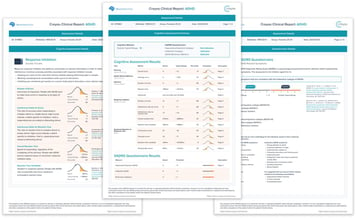
How to Bill Using CPT Code 96132 for Neuropsychological Testing
Disclaimer Please note that Creyos Health can not determine...
Read more
Amy Kryszak, LCSW-R, Director of Healthcare Operations, Dr. Alexander Welge, Director of Medicine and the team at SohoMD have a vision for how care should be delivered. They want to arrive more quickly and confidently at a diagnosis and treatment plan for patients, and reduce the number of visits it takes to stabilize a patient’s mood symptoms.
That’s why they use Creyos.
TABLE OF CONTENTS
SohoMD is a psychiatry practice offering telemedicine and in-person care. Already they have a presence of 33 locations across 21 different US states—and they’re growing! By the end of 2023, they expect to have over 200 providers in their network. They see many patients experiencing ADHD, anxiety, and depression. In smaller numbers, they also treat complex PTSD, stable bipolar disorder, and mild to moderate substance abuse issues.
SohoMD uses Creyos Health cognitive assessments, functional medicine, and traditional psychiatry—all made available through telemedicine—to provide holistic care. With Creyos Health, they can quickly discern whether a patient has ADHD, and stabilize patients’ mood symptoms in fewer visits.
From social media to the clinic: ADHD is trending. At SohoMD, the clinicians have noticed the dramatic increase in demand for ADHD testing. Often, the conversation starts with a patient saying "I think I have ADHD. My friend thinks I have ADHD. My family thinks I have ADHD. I'd like to get tested.”
Many patients come into the clinic already equipped with information about ADHD symptoms they have heard about and identified with via social media. Some even come in with an idea of the medications they’d like to try to ease their challenges with focus or productivity.
What happens when a patient seeks out ADHD testing? In traditional practice, a clinician might have to refer out to a specialist and schedule a psychological examination. Often, these require weeks or months of waiting and can be expensive. Once scheduled, these involve an in-person visit, interview, and computerized testing.
But it’s not only the test itself that is time-consuming and costly. An adult patient coming in may have to take time off work, find childcare, drive from home and back again. After all of that, it can be difficult to schedule follow ups and track the efficacy of prescribed medications, especially when they have to rinse and repeat the process of booking and traveling to an appointment.
At SohoMD, when a patient comes in with concerns that they think are related to ADHD, the clinicians dig deeper to understand the root causes and design an appropriate treatment plan. For Dr. Welge, it was essential to have a scientifically-validated method of assessing ADHD that could be administered at-home, affordably and conveniently, for a broad range of patients.
That’s why they chose Creyos Health.
We needed an objective tool that could help us efficiently get to the right diagnosis and treatment. Ultimately, it's the patient’s sense of wellbeing that's important. Although the patient may think they have ADHD, what they're saying is: I'm not able to pay attention.
At SohoMD, Creyos Health cognitive assessments are used alongside other practices to get a holistic view of the patient’s condition. Functional medicine, or integrative care, plays an important role in their treatment of complex disorders.
In addition to prescribing medications and providing ongoing therapy, SohoMD performs screenings that look deeper into endocrinology, physiology, and biology, to design treatment plans that also include lifestyle and nutrition recommendations.
Over the past several years, Creyos Health cognitive assessments have been a key part of the screening tools SohoMD uses to efficiently get to the root cause of a patient’s particular symptoms—including more accurately diagnosing or ruling out ADHD for concerned patients.
With the data they get from Creyos Health, SohoMD is able to:

At SohoMD a typical patient experience starts with intake. In their first session, a patient discusses their concerns with a psychiatrist, who will then determine which Creyos screenings and assessments to complete before the patient’s next visit.
For example, a patient who believes they have ADHD might express concerns with symptoms of inattention and irritability. Based on this conversation, the clinician can administer assessments such as ASRS for ADHD, the GAD-7 for anxiety, or the MDQ for mood disorders.
SohoMD clinicians might choose to administer several assessments, because they understand that a patient’s symptoms could manifest from a variety of sources. Inattention, for example, can be caused by:
The assessments are completed conveniently at home, usually in less than 25 minutes total. The clinicians at SohoMD often order labs at the same time to get a biochemical understanding of the patient’s current condition.
Then, on a patient’s next visit, the clinicians have a unified report from Creyos Health, plus biochemical reports, rich with information they can use to more quickly identify whether the patient has ADHD, and then decide which treatment to pursue.
Having immediate access to a report usually comforts the patient. It shows that we’re putting in a lot of thought and we’re going to help the patient understand what’s happening in their body. It's an engaging process.
According to Dr. Welge, Creyos Health has been a great fit for their holistic approach to care.
At SohoMD, they’re able to get a patient's screenings done in just one visit or one session at home. Those objective results drive the conversation, throughout a patient’s healthcare journey, towards the right diagnosis and treatment plan, leading to better outcomes.
With this data, SohoMD has been able to stabilize a patient’s mood symptoms in as few as 4 visits. Reducing the number of visits to achieve symptom relief is “a key thing we’re seeing over and over again,” says Dr. Welge.
After seeing such optimistic results for patients, Dr. Welge has championed the platform to other providers, with the aim to get all 200+ clinicians on board. According to Dr. Welge: It’s very hard to get objective data and to be able to get that efficiently and in a cost effective manner. It's a very big breakthrough.
The great thing about Creyos Health is that you not only have objective assessments, but you have subjective screens. You can put that information together for a really powerful tool to navigate the conversation, clearly and efficiently get to the right diagnosis, and achieve better patient outcomes.
Read the full case study to learn how Dr. Welge and SohoMD use Creyos Health to accurately measure the markers of ADHD—including an in-depth example of their patient workflow.


Disclaimer Please note that Creyos Health can not determine...
Read more

With greater awareness of attention deficit hyperactivity...
Read more

Many patients, especially the younger generation, are...
Read more